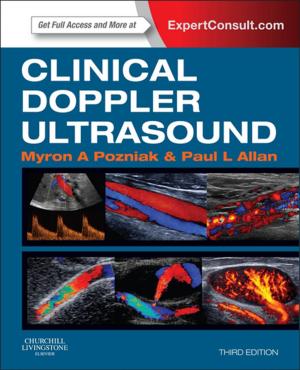Handbook of Veterinary Neurology - E-Book
Nonfiction, Health & Well Being, Medical, Veterinary Medicine, Small Animal| Author: | Michael D. Lorenz, BS, DVM, DACVIM, Joan Coates, BS, DVM, MS, DACVIM, Marc Kent, DVM, BA, DACVIM | ISBN: | 9781437706529 |
| Publisher: | Elsevier Health Sciences | Publication: | December 14, 2010 |
| Imprint: | Saunders | Language: | English |
| Author: | Michael D. Lorenz, BS, DVM, DACVIM, Joan Coates, BS, DVM, MS, DACVIM, Marc Kent, DVM, BA, DACVIM |
| ISBN: | 9781437706529 |
| Publisher: | Elsevier Health Sciences |
| Publication: | December 14, 2010 |
| Imprint: | Saunders |
| Language: | English |
Handbook of Veterinary Neurology provides quick access to vital information on neurologic conditions in a wide range of species, including canine, feline, bovine, caprine, equine, ovine, and porcine. A problem-oriented approach makes it easy to diagnose and treat neurologic problems in small and large animals. The coverage of disorders by problem, not by established disease diagnosis, emulates how animals present to the veterinary hospital and simplifies the formulation of a correct diagnosis. Within each chapter, discussions of neurologic disease include a review of the localization criteria and the diseases that can cause that problem, plus treatment and surgical techniques. Lead author Michael D. Lorenz brings decades of experience to neurologic assessment, using a diagnostic approach that requires minimal knowledge of neuroanatomy.
-
A problem-based approach is organized by presenting sign rather than by condition, guiding you to logical conclusions regarding diagnosis and treatment.
-
Algorithms diagram the logic necessary to localize lesions and to formulate diagnostic plans.
-
Coverage of current diagnostic techniques includes the use of diagnostic tools, such as radiology, spinal fluid analysis, electrodiagnosis, and MR imaging.
-
Case histories in each chapter present a problem and the results of the neurologic examination, then ask you to solve the problem by localizing the lesion, listing probable causes, and making a diagnostic plan. Answers are provided at the back of the book.
-
A consistent format for each case history includes signalment, history, physical examination findings, and neurologic examination.
-
A comprehensive appendix describes species and breeds that have a congenital predisposition for particular neurologic diseases.
-
Extensive references make it easy to pursue in-depth research of more advanced topics.
-
A companion website includes 20 narrated video clips with accompanying PowerPoint slides that correlate to the case histories in the book, covering neurologic assessment and clinical problems such as paresis of one limb, tetraparesis, stupor, seizures, ataxia of the head and limbs, and cranial nerve disorders.
-
Two new co-authors, Jean Coates and Marc Kent, board-certified in neurology, enhance the credibility of this edition.
-
A full-color design and numerous illustrations include enhanced images of neuroanatomy and pathology.
Handbook of Veterinary Neurology provides quick access to vital information on neurologic conditions in a wide range of species, including canine, feline, bovine, caprine, equine, ovine, and porcine. A problem-oriented approach makes it easy to diagnose and treat neurologic problems in small and large animals. The coverage of disorders by problem, not by established disease diagnosis, emulates how animals present to the veterinary hospital and simplifies the formulation of a correct diagnosis. Within each chapter, discussions of neurologic disease include a review of the localization criteria and the diseases that can cause that problem, plus treatment and surgical techniques. Lead author Michael D. Lorenz brings decades of experience to neurologic assessment, using a diagnostic approach that requires minimal knowledge of neuroanatomy.
-
A problem-based approach is organized by presenting sign rather than by condition, guiding you to logical conclusions regarding diagnosis and treatment.
-
Algorithms diagram the logic necessary to localize lesions and to formulate diagnostic plans.
-
Coverage of current diagnostic techniques includes the use of diagnostic tools, such as radiology, spinal fluid analysis, electrodiagnosis, and MR imaging.
-
Case histories in each chapter present a problem and the results of the neurologic examination, then ask you to solve the problem by localizing the lesion, listing probable causes, and making a diagnostic plan. Answers are provided at the back of the book.
-
A consistent format for each case history includes signalment, history, physical examination findings, and neurologic examination.
-
A comprehensive appendix describes species and breeds that have a congenital predisposition for particular neurologic diseases.
-
Extensive references make it easy to pursue in-depth research of more advanced topics.
-
A companion website includes 20 narrated video clips with accompanying PowerPoint slides that correlate to the case histories in the book, covering neurologic assessment and clinical problems such as paresis of one limb, tetraparesis, stupor, seizures, ataxia of the head and limbs, and cranial nerve disorders.
-
Two new co-authors, Jean Coates and Marc Kent, board-certified in neurology, enhance the credibility of this edition.
-
A full-color design and numerous illustrations include enhanced images of neuroanatomy and pathology.















